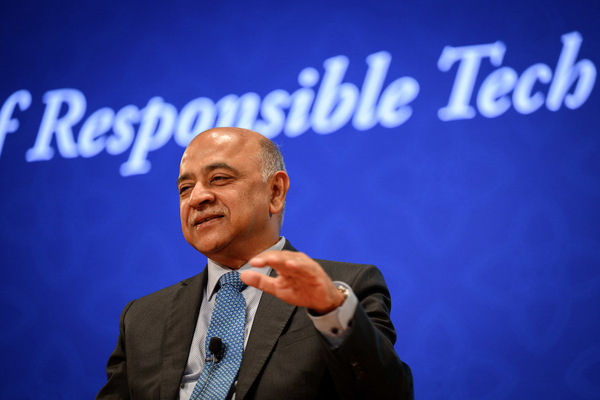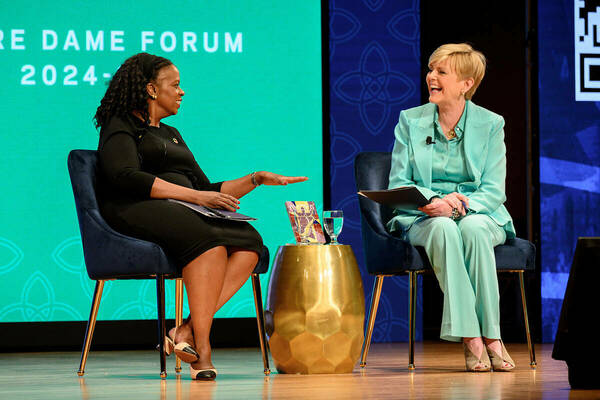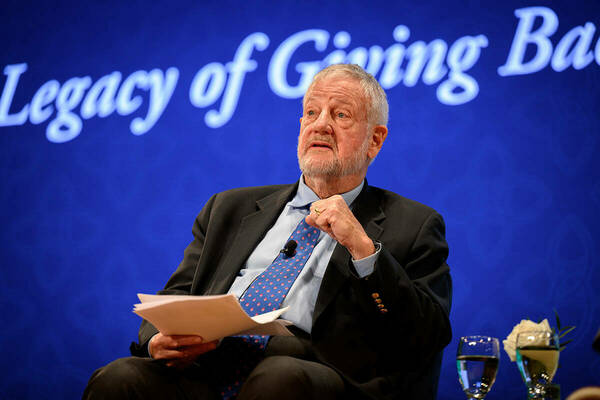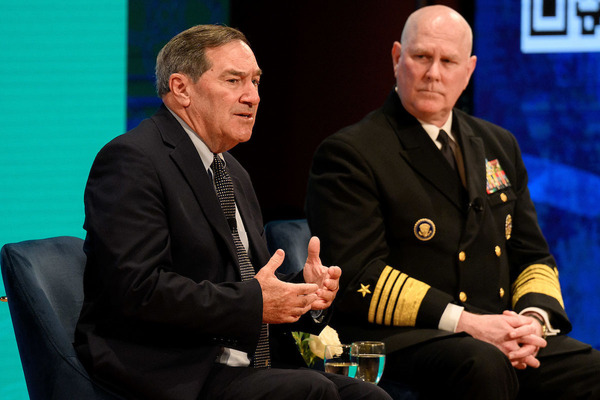Global leaders discuss ‘What do we owe each other?’ in 2024-25 Notre Dame Forum Inauguration Series
The historic Inauguration of Rev. Robert A. Dowd, C.S.C., included a special Notre Dame Forum event on Thursday, Sept. 11, addressing this year’s theme, “What do we owe each other?” The Forum’s Inauguration Series featured four “fireside chats” with distinguished leaders in technology, global development, philanthropy and foreign affairs. Equally notable were the moderators — leaders from business, finance, the media and the academy — who led the thoughtful and inspiring conversations before fielding questions from hundreds of audience members in the DeBartolo Performing Arts Center’s Leighton Concert Hall and many others who joined the conversation via livestream.
Since its establishment in 2005, each year the Notre Dame Forum invites campus-wide dialogue about issues of importance to the University, the nation and the larger world. This year’s theme, chosen by Father Dowd, invites reflection on our responsibilities to one another. In a world where ideological and cultural divisions seem to have deepened, the Forum aims to bring people together across differences to face the most pressing challenges of our time.
The Future of Responsible Tech

In a conversation with John Veihmeyer, former global chairman of KPMG and current chair of Notre Dame’s Board of Trustees, Arvind Krishna, IBM’s chairman and CEO, kicked off the Inauguration Series by sharing his thoughts on the future direction of responsible technology.
He compared the recent rise in awareness around generative AI to the broad adoption of internet use when the first web browser was created in 1995.
“AI by itself is not new,” said Krishna. “[OpenAI] is building on 20 years of research and progress, and now the next thing is to make it easy…That accessibility and ease of use of this generation of what is called ‘large language models,” is about. And when you make things effectively–that means 100 times cheaper or more accessible–as you all know, that’s a big difference. So I think the world is still grappling with, ok we kind of knew this, but how many things can we do now using these new technologies?”
Krishna and Veihmeyer discussed the responsible application of AI as well as the role society and government will need to play in determining the regulations that are needed.
“There are so many factors that are going to play into this. One is ethics, which for us the lens becomes ‘What is [AI] used for, what should it be used for?’ But equally important, ‘What is it trained on?’ And that has ethics in it, but it also is eventually going to have, I think, legislation in it,” Krishna said. “At IBM, we have principles around trust and transparency. Those are really important to us.”
They also addressed how academia, including groups such as the Notre Dame-IBM Tech Ethics Lab, and policymakers should work together to establish rules for how AI can be used. Krishna provided insight into IBM’s goal as a technology ethics leader, explaining that they hold themselves responsible to their consumers, including considering how the data curated for training their AI and the emergence of quantum computing can be used to address some of the world's most pressing problems.
“Do I want to design a better battery for an electric vehicle? Do we want to design better fertilizer? Do we want to design more lightweight materials that are still very strong? Do I want to be able to get more energy out of an existing oil well? These are all problems that I think a quantum computer is going to address … I think we will be able to approach them in the five- to seven-year time frame, which means by the end of this decade,” Krishna said.
Business as a Global Force for Good

Sanda Ojiambo, assistant secretary-general, CEO and executive director of the United Nations Global Compact, discussed the role of ethical leadership in business and her optimism about the global future with Anne Thompson, chief environmental affairs correspondent for NBC News.
A voluntary program, the Global Compact was designed to encourage and support businesses in tackling persistent problems facing the global community, like water cleanliness, according to Ojiambo. She said to solve these major issues, government and business need to work together.
“Governments need to set policy frameworks,” she said. “Businesses can then come in and look at issues like distribution, but you need the two working in tandem.”
A Kenyan national, Ojiambo has worked in business and nonprofit organizations in areas of education, maternal support, environmental conservation, gender violence and investing. Of the Global Compact’s 17 goals, she said top priorities include the climate crisis and agriculture and food systems, with water cleanliness falling below its deserved level of importance. In response, Thompson noted that Pope Francis’ encyclical on the environment in which he referred to clean water as a human right.
“Water isn’t seen as the finite resource that it is,” Ojiambo said. “We have a climate conference every year. We have a Human Rights Council. We just haven’t done that for water. There are millions of people in the world that just don’t have access to safe drinking water.”
Noting the efforts of Notre Dame’s Mendoza College of Business to “grow the good in business,” Thompson asked Ojiambo how to best educate business leaders to be a force for good.
“Business schools have a huge challenge and opportunity because there is so much that is unknown about the world,” Ojiambo said. “Instill a global perspective where they’re ready to embrace the world and the uncertainty that exists. No business is perfect. What we look for is progress.”
Mendoza has publicly committed to adhering to the UN Global Compact’s Principles for Responsible Management Education (PRME), and its Deloitte Center for Ethical Leadership was a co-sponsor of Ojiambo’s visit to campus.
A Legacy of Giving Back

Philanthropist and environmentalist David Rockefeller Jr. spoke with Jack Brennan, retired CEO and chair of Vanguard and a member of Notre Dame’s Board of Trustees, on his lifelong commitment to giving back. Rockefeller, who has served as citizen chair of the National Parks Foundation and chair of the Rockefeller Foundation, has dedicated himself to furthering his family’s contributions to education, the arts, innovation, conservation and social justice.
Brennan began by highlighting the transformative impact of the Rockefeller family, including the founding of Spelman College and the University of Chicago, the establishment of several national parks and the creation of the Lincoln Center for the Performing Arts and the Museum of Modern Art in New York.
He asked Rockefeller how the family has maintained their motivation and strength in philanthropy across several generations.
“The act of making philanthropic decisions together,” Rockefeller said. “Businesses can tear families apart, right? And they don’t always, but there’s a big risk. Whereas philanthropy tends, I think, to draw people together, and that’s true in our case.”
Rockefeller and Brennan discussed the value of global engagement, public service and higher education, as well as the importance of diversity.
“Diversity … I deeply believe is the necessary condition for all of us getting along in the world,” Rockefeller said. “We not only need to believe abstractly in it, we need to come up against people who are not ourselves, understand them, understand their ways and their backgrounds.”
Rockefeller also emphasized to Notre Dame students, in particular, that people should consider their own passions when determining how to best contribute to a world in need.
“The media lets us know every day how many urgent problems there are, but, you know, what is your skill? What is your interest? … Where is there not only the need, but the lever to address that need?” he said. “I think you’ve got to think about what you care about, what you can bring and where the opportunities are for you to make a difference. And focus — don’t try to do 10 things at once.”
Advancing Peace in a Fractured World

Adm. Christopher W. Grady, the 12th vice chairman of the Joint Chiefs of Staff, and Joe Donnelly, former U.S. ambassador to the Vatican and former U.S. senator, joined John T. McGreevy, the Charles and Jill Fischer Provost, to discuss peacebuilding and diplomacy in the fourth and final session of the Inauguration Series. Grady, a Notre Dame alumnus, received his commission through Notre Dame’s Naval Reserve Officers Training Corps and is the nation’s second highest-ranking military officer. Donnelly, also an alumnus, represented Indiana in the U.S. House of Representatives and U.S. Senate before serving as the U.S. ambassador to the Holy See under President Joe Biden.
While discussing the state of diplomacy around the world and the prospects for peace in 2024, both Donnelly and Grady pointed to the importance of the U.S. in establishing a model of peace for the rest of the world to emulate. From his years of serving abroad as a diplomat and politician, Donnelly heard firsthand how crucial U.S. support and dependability is to countries such as Afghanistan, Ukraine and Israel.
“The world is looking toward us,” Donnelly said, “and so you tell me how we do in the United States this year, and I’ll tell you the prospects for peace.”
For Grady, whose military career has spanned four decades, the world that we are passing down to our children is “increasingly congested, contested, competitive and prone to conflict.” But, Grady said, in spite of all of that, he doesn’t consider war to be inevitable or that lasting peace is unattainable. “We can get there, and it is U.S. leadership in the world that will do that.” By leveraging the strong ties the U.S. has with its global allies and partners, “peace has a chance,” he added.
To bring people together in our polarized country to face the challenges of our times, Donnelly said he supports the idea of a national year of service, whether it be through the military or teaching — referencing Notre Dame’s ACE program as an example.
“When you give of yourself, you connect to a place,” Donnelly said. “I worry about how connected everybody is to this amazing country that we have. And I worry about how everybody is almost an island of their own, as opposed to a country pulling together. Let’s come together and let’s be a strong nation that supports our allies and our friends.”
When asked what gives him hope, Grady said, “It has to be a pursuit of truth.
“And I think what Notre Dame does better than anybody else is it enables our students to get after the truth, to be a discerning consumer of all of the various things that are out there.”
Donnelly, who is now a Notre Dame faculty member teaching in the political science department and the Keough School of Global Affairs, said that the greatest lesson he learned from Pope Francis while serving in the Vatican was the way in which he “looks out for the least of us.”
“His focus is on how I can make sure that every person has a chance. He truly is a reflection of what you would think Jesus might be on Earth,” Donnelly said.
This final conversation was co-sponsored by Notre Dame Student Government.
You can watch the recordings of all four “fireside chats” here. Visit forum.nd.edu for more information.
Originally published by at news.nd.edu on September 17, 2024.
Latest Research
- Habitat partnership bears fruit for homebuyers in South BendJoel Gibbs was about five years into his job as a maintenance technician at the University of Notre Dame when the message arrived in his inbox. “Find out if you qualify to build a new home with Habitat,” read the headline in the March 7, 2023, edition of NDWorks Weekly, the weekly…
- Former U.S. Department of State Official Uzra Zeya Added to Kroc Institute Advisory Board in 2025Uzra Zeya, most recently the Under Secretary for Civilian Security, Democracy, and Human Rights for the U.S. Department of State, has joined the advisory board of the Kroc Institute for International Peace Studies, part of the Keough…
- Notre Dame business school and College of Engineering to launch new double majorMendoza students currently in their first year at Notre Dame will be able to apply for the double major when they declare their majors.
- A Wider Path to Notre DameMore than 100 international students arrive at Notre Dame each August for their first year of college. Some…
- Notre Dame Students Acknowledged in National Report on Wage Theft by the Economic Policy InstituteNOTRE DAME, IN.— Students with the Notre Dame Student Policy Network (SPN) were recognized in a new report by the Economic Policy Institute, a leading nonpartisan think tank dedicated to countering economic…
- Notre Dame selected as ACS Bridge Department, expanding opportunities for students in chemistry and biochemistryThe University of Notre Dame’s Department of Chemistry and Biochemistry has been named an American Chemical Society (ACS) Bridge Department, an honor recognizing the University's dedication to providing targeted support to students from historically marginalized groups who are pursuing graduate degrees…












